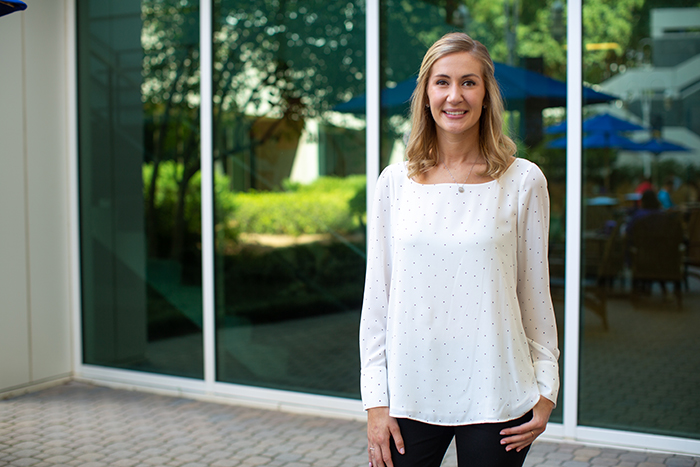Years of anti-human trafficking experience led Newsom 20L to pursue JM

Typically, Emory Law’s juris master program is legal education for professionals who want to advance their careers by understanding how the law affects their field.
Madeline Newsom 20L saw it differently. She viewed it as a way to learn a lot about international human rights in a compressed timeframe—from the faculty of a top-ranked law school, and in the intellectually competitive company of 3Ls. She’s the youngest person in her class and turned 23 just a few days before graduation this month. She’s also president of the JM Society.
In the nine-month residential program, Newsom was the first JM student to be accepted to the International Human Rights practicum led by Adjunct Professor Henrikas Mickevičius. It was a tough class but also a favorite, which carries a minimum requirement of 150 hours. Newsom acted as a junior lawyer for cases and projects related to the United Nations Working Group on Enforced or Involuntary Disappearances. Because of her previous experience with trafficked and exploited individuals she found the work interesting because the cases involved people “disappeared” by their own government, rather than an individual.
While earning her B.A. in Peace and Conflict Studies at the University of North Carolina at Greensboro, Newsom worked as a paralegal for over three years. She also volunteered with Abolition NC, an anti-human trafficking nonprofit.
Greensboro, where Newsom grew up, is progressive college town in the Piedmont with a history built on railroads. It’s nicknamed “The Gate City” because it’s a longtime transit hub that offers multiple ways to move goods—by rail, air and highway—which also makes it attractive to those who sell humans.
“You can go straight up to New York or D.C., straight down to Atlanta, and straight out to the coast to Wilmington,” Newsom said. “Or you can hit I-40 and go as far out west as you want.”
She’s volunteered with Abolition NC since 2015, where her clients ranged from a 10-year-old who didn’t recognize she was being trafficked to an African refugee in her 40s who had so many stab and gunshot scars “that half her facial nerves couldn't move when she smiled,” Newsom said. But she also saw people heal after incredible damage.
“I've watched one survivor grow up from 15 to 20. She was my age the entire time,” Newsom said. “Now she's doing really well—she's on her feet and she has a job and she's out of the abuse.” Newsom’s father, Gil, served on the board of the organization. She says she’s seen him help people immediately and hands-on all her life—with food, a ride, or a place to stay.
Abolition NC lobbied for a state law passed in 2015 that requires public schools to provide education on human trafficking. Newsom was a member of the curriculum committee who developed content that varied depending on the age of the student. That legislative experience demonstrated for her how law allows you to create change beyond the present at-risk victim before you.
“I chose Emory for its reputation in international human rights law,” she said. “I looked up the professors at each university where I applied to make sure that it was an environment I would really want to be in and professors I would really want to learn from and have as mentors.”
She reached out via email to Johan van der Vyver, I. T. Cohen Professor of International Law and Human Rights. His work began in his native South Africa during apartheid, and Newsom took classes with him both semesters.
“Having had Madeline in almost all of my classes added a very positive dimension to those classes,” van der Vyver said. “Her participation in class discussions and the grades she received placed her on the same level of excellence as the best of the best of JD students, including the 3Ls in my classes.” Those grades were A+’s, he adds.
Newsom is back home in Greensboro, applying for jobs in the human rights field.
“My aspirations have definitely changed over the past year,” she said. “I would love to continue advocating for those in conflict-prone situations.” One way of doing so would be pursuing jobs that involve legislation for education and restoration. “I don’t necessarily have a dream title or goal,” she said. “I’m very much one of those individuals who enjoys every moment in life and lets life lead me where I need to be.”